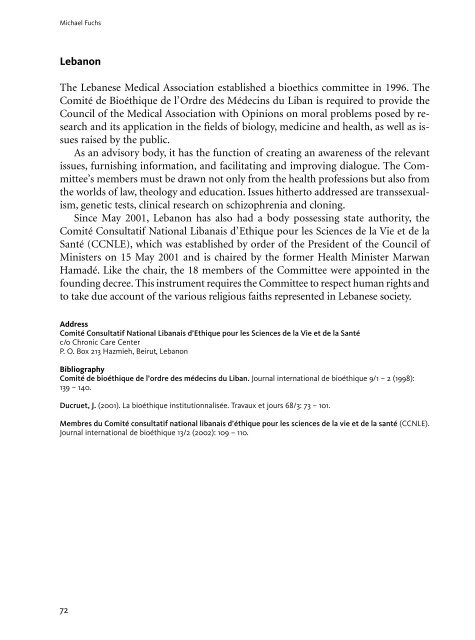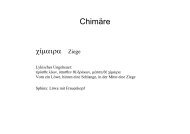Michael Fuchs National ethics councils - Deutscher Ethikrat
Michael Fuchs National ethics councils - Deutscher Ethikrat
Michael Fuchs National ethics councils - Deutscher Ethikrat
You also want an ePaper? Increase the reach of your titles
YUMPU automatically turns print PDFs into web optimized ePapers that Google loves.
<strong>Michael</strong> <strong>Fuchs</strong> <strong>National</strong> <strong>ethics</strong> <strong>councils</strong>. Their backgrounds, functions and modes of operation compared<br />
Lebanon<br />
The Lebanese Medical Association established a bio<strong>ethics</strong> committee in 1996. The<br />
Comité de Bioéthique de l’Ordre des Médecins du Liban is required to provide the<br />
Council of the Medical Association with Opinions on moral problems posed by research<br />
and its application in the fields of biology, medicine and health, as well as issues<br />
raised by the public.<br />
As an advisory body, it has the function of creating an awareness of the relevant<br />
issues, furnishing information, and facilitating and improving dialogue. The Committee’s<br />
members must be drawn not only from the health professions but also from<br />
the worlds of law, theology and education. Issues hitherto addressed are transsexualism,<br />
genetic tests, clinical research on schizophrenia and cloning.<br />
Since May 2001, Lebanon has also had a body possessing state authority, the<br />
Comité Consultatif <strong>National</strong> Libanais d’Ethique pour les Sciences de la Vie et de la<br />
Santé (CCNLE), which was established by order of the President of the Council of<br />
Ministers on 15 May 2001 and is chaired by the former Health Minister Marwan<br />
Hamadé. Like the chair, the 18 members of the Committee were appointed in the<br />
founding decree. This instrument requires the Committee to respect human rights and<br />
to take due account of the various religious faiths represented in Lebanese society.<br />
Address<br />
Comité Consultatif <strong>National</strong> Libanais d’Ethique pour les Sciences de la Vie et de la Santé<br />
c/o Chronic Care Center<br />
P. O. Box 213 Hazmieh, Beirut, Lebanon<br />
Bibliography<br />
Comité de bioéthique de l’ordre des médecins du Liban. Journal international de bioéthique 9/1 – 2 (1998):<br />
139 – 140.<br />
Ducruet, J. (2001). La bioéthique institutionnalisée. Travaux et jours 68/3: 73 – 101.<br />
Membres du Comité consultatif national libanais d’éthique pour les sciences de la vie et de la santé (CCNLE).<br />
Journal international de bioéthique 13/2 (2002): 109 – 110.<br />
72<br />
Tunisia<br />
Tunisia created the Comité <strong>National</strong> d’Ethique Médicale (CNEM) by the Law of 29<br />
July 1991. Its mandate and the enumeration of the issues for which it is competent<br />
are modelled on the French example, whose wording is sometimes reproduced verbatim.<br />
The Committee comprises a chair and 18 members, each of whom are appointed<br />
for a three-year term. The first issue addressed by the Committee was assisted<br />
reproduction (Avis No. 1, 1996), followed by aspects of the establishment of local<br />
<strong>ethics</strong> committees and cloning (Avis No. 3, 1997). In its fourth Opinion, it considered<br />
questions of allocation (Ethique – progrès technologiques et dépenses de santé, 1999).<br />
Address<br />
Comité <strong>National</strong> d’Ethique Médicale<br />
B. P. 74<br />
Institut Pasteur de Tunis<br />
1002 Tunis Belvédère, Tunisia<br />
Bibliography<br />
Ben Ali, Z. E. (2001). Loi n° 2001-93 du 7 août 2001, relative à la médecine de la reproduction. Journal international<br />
de bioéthique 12/4 (2001): 93 – 99.<br />
CNEM (1998). Première conférence annuelle du Comité national d’éthique médicale. Amphithéâtre – Institut<br />
Pasteur de Tunis, 25 avril 1996. Thèmes: La formation en bioéthique, Bioéthique: recherches et applications.<br />
Journal international de bioéthique 9/1 – 2: 149.<br />
CNEM (1998). Rapport sur les comités d’éthique locaux (1997). Journal international de bioéthique 9/1 – 2: 151 – 156.<br />
CNEM (2000). Nominations. Par arrêté du Ministre de la Santé publique de 27 avril 1998. Journal international<br />
de bioéthique 11/2: 86.<br />
CNEM (2002). Avis n° 3 du 22 mai 1997: Le clonage. Journal international de bioéthique 13/2: 115 – 119.<br />
CNEM (2002). Avis n° 4 du 26 janvier 1999: Éthique, progrès technologiques, dépenses de santé. Journal international<br />
de bioéthique 13/1: 97 – 106.<br />
Ministère de la Santé Publique (2001). Décret n° 2001 – 2133 du 10 septembre 2001, modifiant et complétant le<br />
Décret n° 94 – 1939 du 19 septembre 1994, fixant les attributions, la composition et les modalités de fonctionnement<br />
du Comité national d’éthique médicale. Journal international de bioéthique 12/4: 101 – 103.<br />
Ministre de la Santé Publique (2002). Arrêté du Ministre de la Santé publique du 10 août 2001 portant<br />
nomination des membres et du Président du Comité national d’éthique médicale. Journal international de<br />
bioéthique 13/1: 107 – 108.<br />
Tunisie. Comité national d’éthique médicale. Cahiers du Comité consultatif national d’éthique pour les<br />
sciences de la vie et de la santé 26 (2001): 52 – 53.<br />
73




